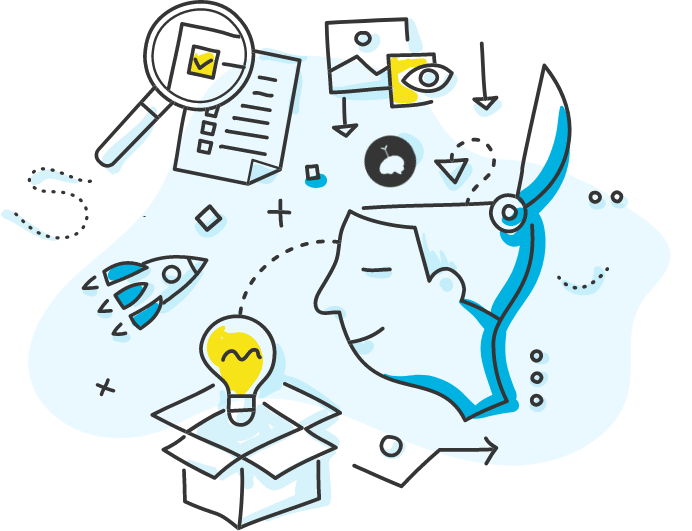Estimated Reading Time: 3 minutes, 11s.

According to dietician Gail Posner, when you don’t focus on what you eat, you will gain weight.1 This week is Focus Week on A Year of Productivity, where every article I write has to do with improving your focus. Just as being able to focus can help you with procrastination and multitasking, it can also help you lose weight and eat less.
Below are four ways you can use the power of focus to your advantage to eat better and lose weight.
1. Eat Mindfully
When you eat, you likely do something else at the same time, like watching TV, sitting in front of the computer, reading, or talking to people. The problem is, when you divide your focus between eating and other things, you lose track of how much you eat.
Mindful eating “lets your brain know that you will soon feel full and satisfied”, and “once this satisfaction registers upstairs, your urge to keep munching decreases”.2 Mindful eating essentially links your brain with your stomach, which makes your sense of fullness kick in quicker.
 So how exactly can you practice mindful eating? It’s simple. First, do your best to reduce the number of distractions around you that will dilute the attention you can give to what you are eating. Second, pay attention to your food – how it smells, tastes, and feels. This is naturally difficult to do all of the time, because you likely do not eat every meal alone, and because it can be hard to eliminate distractions. Practicing eating mindfully a few times a week, though, can greatly strengthen the link between your brain and stomach, and will make you eat better.3
So how exactly can you practice mindful eating? It’s simple. First, do your best to reduce the number of distractions around you that will dilute the attention you can give to what you are eating. Second, pay attention to your food – how it smells, tastes, and feels. This is naturally difficult to do all of the time, because you likely do not eat every meal alone, and because it can be hard to eliminate distractions. Practicing eating mindfully a few times a week, though, can greatly strengthen the link between your brain and stomach, and will make you eat better.3
2. Keep a diary of what you eat
According to the book RAPT, which inspired this article, people who keep a diary of the food they consume “usually eat up to a third less food than people who don’t”. When you think about it, that’s incredible.
When you keep track of what you eat, you:
- Become aware if you are eating too much
- Think more about eating foods that are bad for you
- Notice trends of unhealthy eating (like during certain time periods, or at certain parts of the week)
There are some great online and mobile food diary apps, like MyNetDiary (which my girlfriend loves), and LiveStrong’s The Daily Plate, which I used for a couple of years and loved. These days, I prefer a good old fashioned pen and paper.
3. Ask yourself where you’re hungry
This method fits well with my idea of self-honesty, where being honest with yourself is a big key to becoming more productive.
The next time you’re hungry, physically point to where on your body you’re hungry. According to Posner:4
- If you point to your head, you’re upset about something. In this case it might be a good idea to take a step back from what you’re about to eat and find another outlet to relieve your stress.
- If you point to your mouth, you just want to taste something exciting. Ask yourself: are you eating enough exciting foods already? Should you be mixing up what you eat more to make food more enjoyable to you?
- If you point to your stomach, you’re actually hungry.

The best part of writing this article was looking up some great pictures of food.
4. Take smaller portions
In one widely-cited study, participants were given two week-old nasty, stale popcorn, either in a medium-sized or large-sized bucket. Participants who ate out of the larger bucket ate 33.6% more popcorn than people who were given the smaller bucket, even though nearly all of them said the size of the bucket wouldn’t affect how much they ate.5
Eating mindfully would naturally help you with a situation like this, but so would changing the size of your proverbial “bucket” at home. When you don’t load your plate up with so much food, you take more time to think about whether you actually want another portion.
Summary
Eating better and eating less starts with focus. When you’re surrounded by distractions when you eat, you will devote much less attention to what you’re eating, and you will eat more. Eating mindfully, keeping a food diary, asking yourself where you’re hungry when you want a snack, and taking smaller portions are all great ways to use focus to eat less and lose weight.
Another great resource on mindful eating is the book Savor. I read the book about a year ago, and it’s a terrific resource if you want to dive deeper into the world of mindful eating. ↩
Source: http://foodpsychology.cornell.edu/research/summary-popcorn.html ↩




